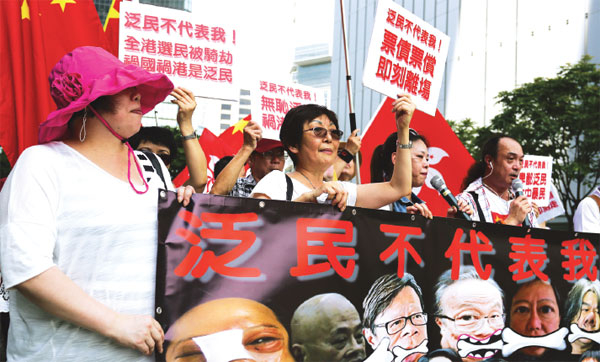 |
|
Residents wave banners condemning the opposition during a rally in support of the electoral reform package outside the Central Government Offices on June 11, 2015. Parker Zheng / China Daily |
Never before has the Hong Kong public been so close to the dream of securing a "one man, one vote" chief executive election.
Voters are now placing their trust on lawmakers to cast their votes with Hong Kongers' best interests and the city's prosperity in mind, approve the motion and give the SAR's democratic development a welcome boost.
Democracy was but a mirage during Britain's colonial rule of Hong Kong for over 150 years. Successive Hong Kong governors were all appointed by Britain rather than by Hong Kong citizens, while the British took the majority of senior positions in the Hong Kong government.
It was not until Hong Kong's return to China in 1997 that greater political rights were bestowed to Hong Kong citizens, thanks to the implementation of the principles of "one country, two systems" and "Hong Kong people governing Hong Kong" with a high degree of autonomy.
For the past 18 years, the international community has witnessed substantial democratic and constitutional development in the Asian financial hub.
One ultimate goal of the Basic Law, Hong Kong's mini-Constitution, is to achieve universal suffrage in the chief executive election, and two separate legal decisions passed by China's top legislature, issued in 2007 and 2014 respectively, confirmed the central government's support of this proposal.
Before the electoral reform plan was unveiled, the central authorities reached out to people from all walks of life in Hong Kong to explain its decisions, and the HKSAR government held two public consultations.
The plan proposes that SAR chief executive candidates will be picked by a 1,200-member nominating committee from four social sectors consisting of 38 sub-sectors.
Wednesday's motion, an embodiment of the principles of balanced participation and consultative democracy, is the most democratic institutional arrangement and the most viable institutional innovation in the history of Hong Kong.
The LegCo's deliberation on the motion should be the "last push" in Hong Kong's democratic drive.
Should the motion be passed, this could translate into greater social solidarity and development in Hong Kong, and could help the new chief executive improve governance. It is also conducive to Hong Kong's economic growth, improvement of people's livelihoods and the advancement of the cause of "one country, two systems."
